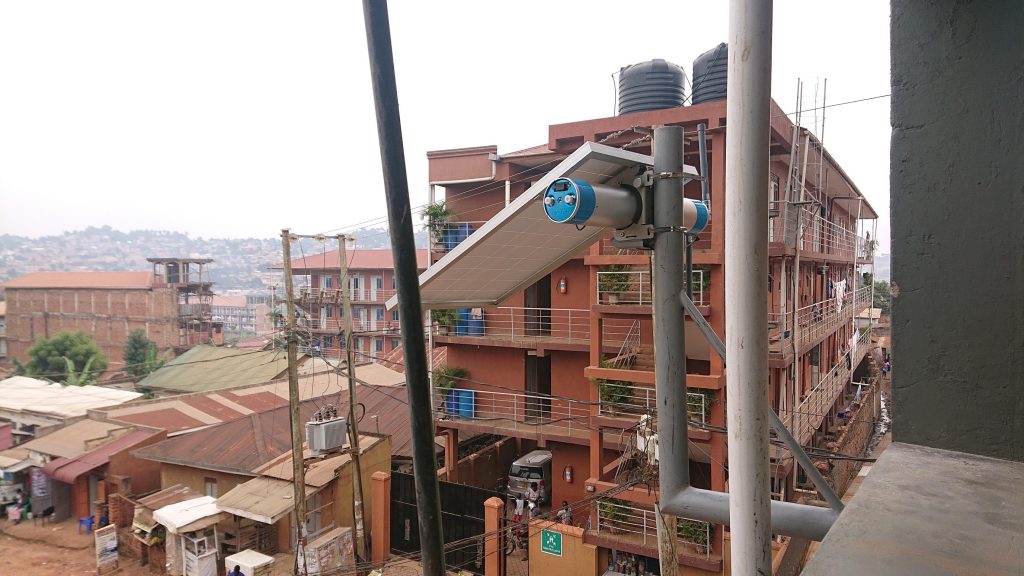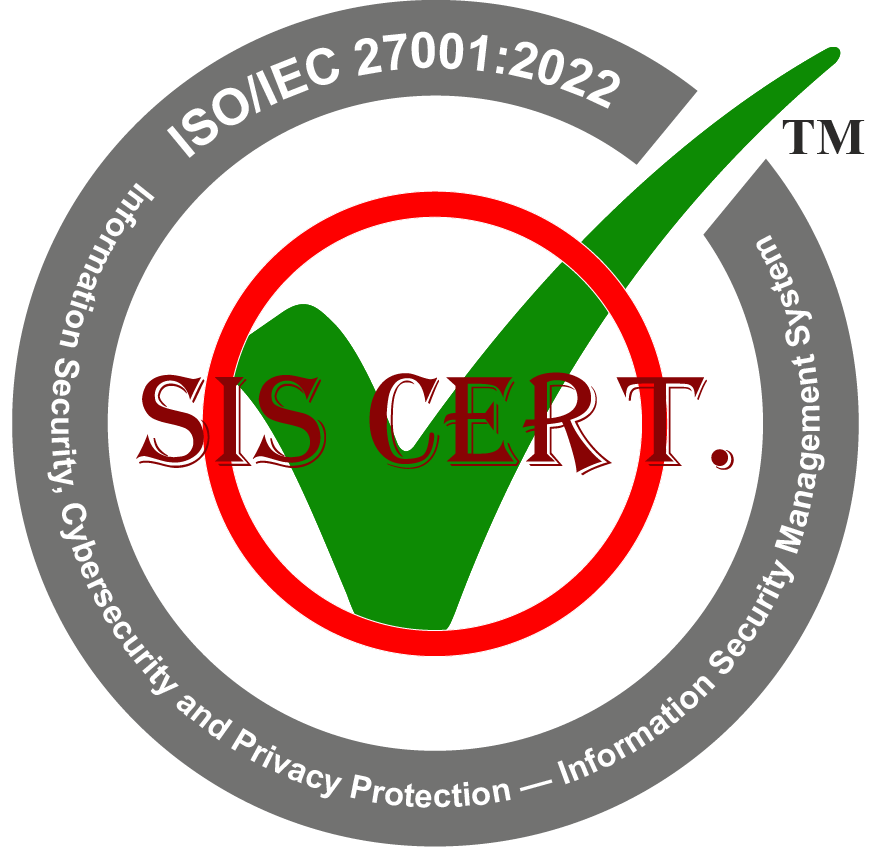According to the Uganda Communications Commission (UCC), Uganda had 27.7 million active Internet subscriptions in mid-2023 with the typical user consuming only 1.7 GB of mobile data per month in the first quarter of 2023 which was barely enough to stream a single two-hour lecture in standard definition. The Internet Poverty Index helps explain this disconnect. It classifies almost three-quarters of Ugandans as “Internet-poor,” meaning they cannot afford the minimum 1 GB at 10 Mbps that the index uses to gauge basic digital opportunity.
This triple effect of affordability, data caps and slow speeds leaves millions of students and researchers offline as soon as they step off campus. Metro eduroam tackles all three bottlenecks at once; it delivers unlimited, high-speed, institution-grade Wi-Fi, free of charge, at hostels, cafés and other public spaces. Each hotspot effectively lifts its neighbourhood out of Internet poverty, turning the promise of national subscription growth into genuine, usable connectivity for learning and research.
Metro eduroam is an extension of on-campus eduroam (education roaming), a global initiative that allows users from participating institutions to connect securely to Wi-Fi networks using their institutional credentials at any eduroam-enabled location worldwide. In response to the urgent need for remote Internet access during the COVID-19 lockdowns, Metro eduroam was first introduced in Uganda in 2020 to address connectivity gaps for Uganda’s academic and research community. With institutions temporarily closed during the COVID-19 outbreak, thousands of students and staff were unable to access on-campus networks. To meet this critical demand, Metro eduroam was invented in Uganda and deployed at 300 hotspots across Kampala, Mukono, and Entebbe, extending access to hostels, libraries, cafés, and other public areas. The initial hotspots were set up using commercial infrastructure providers that already had Wi-Fi Access Points (APs) in Uganda.
In May 2022, RENU expanded the Metro eduroam network to 18 additional towns across Uganda with support from the Internet Society Foundation’s BOLT (Building Opportunities/Leveraging Technologies) program. However, this implementation turned out to be costly, was prone to frequent power outages, and lacked adequate service monitoring and support. As a result, some hotspots were shut down later by the providers, adversely impacting the eduroam service.
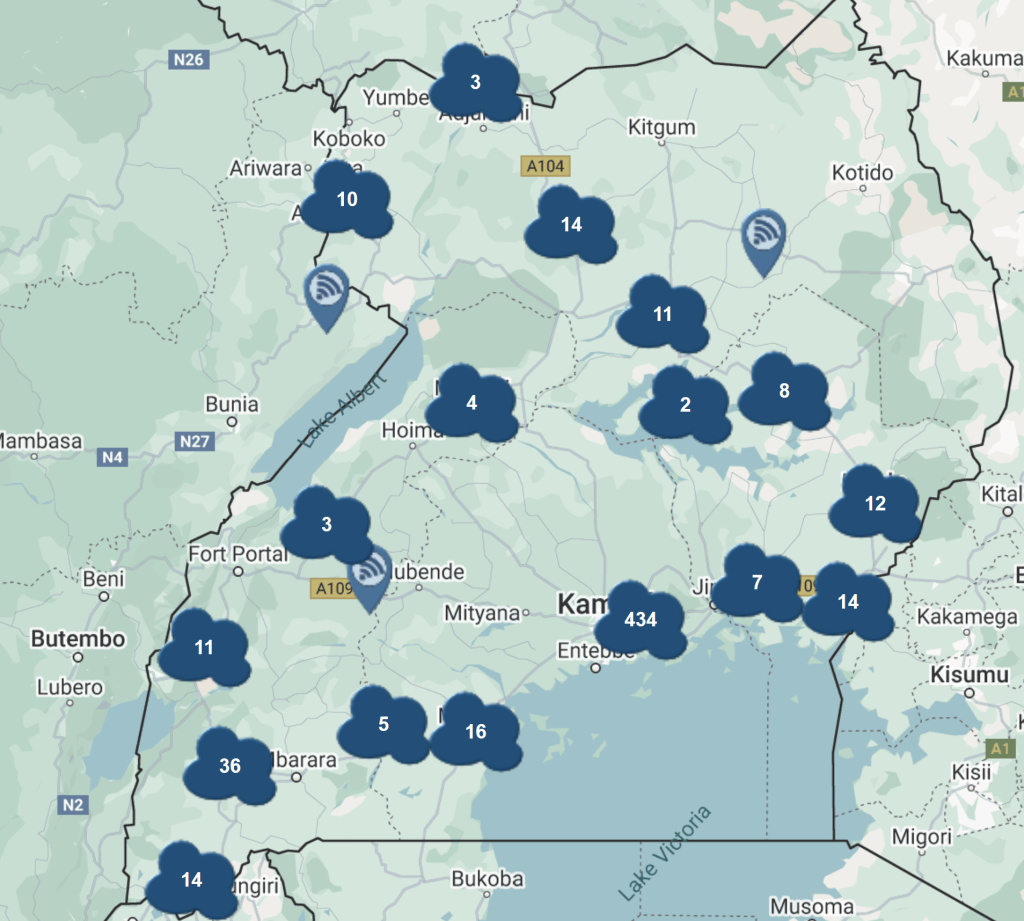
Figure 1: eduroam hotspot locations in Uganda (https://eduroam.renu.ac.ug/ ) .
To overcome the challenges faced during the initial deployment, RENU significantly expanded its eduroam footprint across the country in 2024 using the solar-powered Wi-Fi Access Points manufactured by RENUMESH Technologies. By the end of the year, RENU had deployed 600 eduroam hotspots with 150 of them being solar-powered. This nationwide expansion was made possible with a second grant from the Internet Society Foundation’s BOLT program.
The routers combine solar energy with cutting-edge wireless technology to provide reliable Internet access. As the first solar-powered Internet routers produced in Uganda, they offer an affordable and stable connectivity option for both homes and businesses, eliminating the need for cabling, reliance on unstable electricity, and recurring power costs.
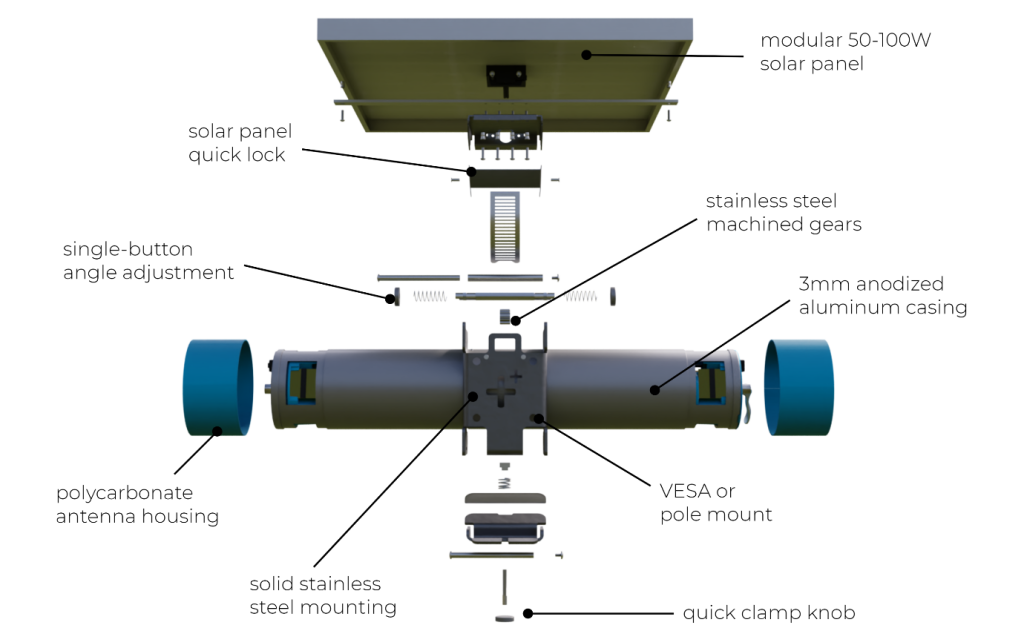
Figure 2: Solar-powered router components.
These devices are resilient to power outages and have robust service monitoring capabilities, enabling RENU to extend coverage to remote and underserved areas. Following this expansion of the Metro eduroam service, Internet capacity demand has surged from 100 Mbps in 2022 to 1 Gbps in April 2025. The number of institutions joining eduroam has increased drastically, rising from 20 in December 2020 to 256 in April 2025, driven by the desire to access the Metro eduroam service. Additionally, successful logins have surged over the years, with the most significant occurring in 2024, attributed to the widespread deployment of RENU-owned solar-powered routers across the country.
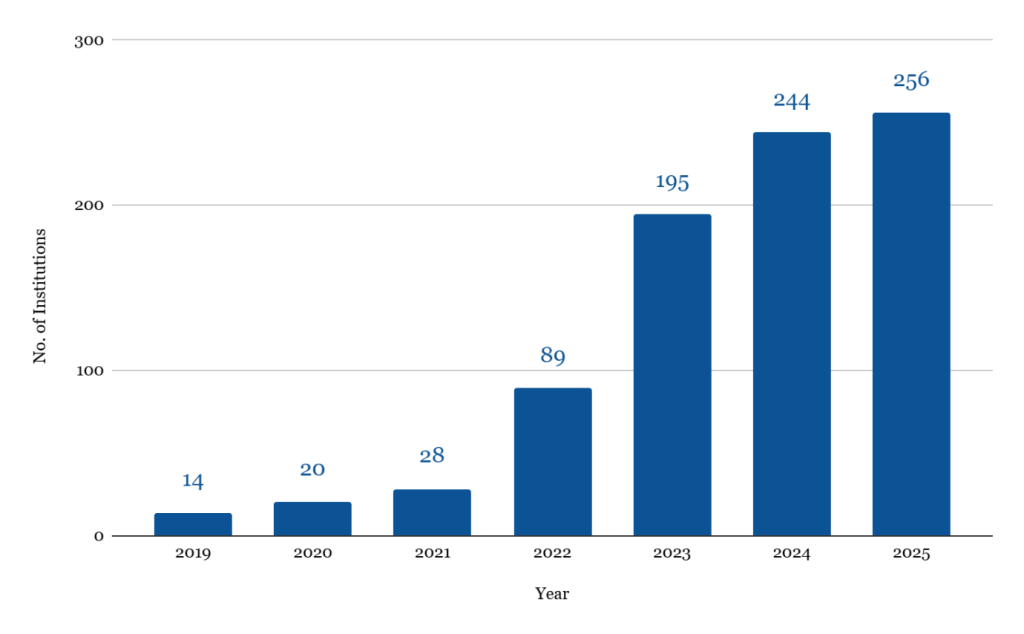
Figure 3: Number of institutions that have joined eduroam over the years.
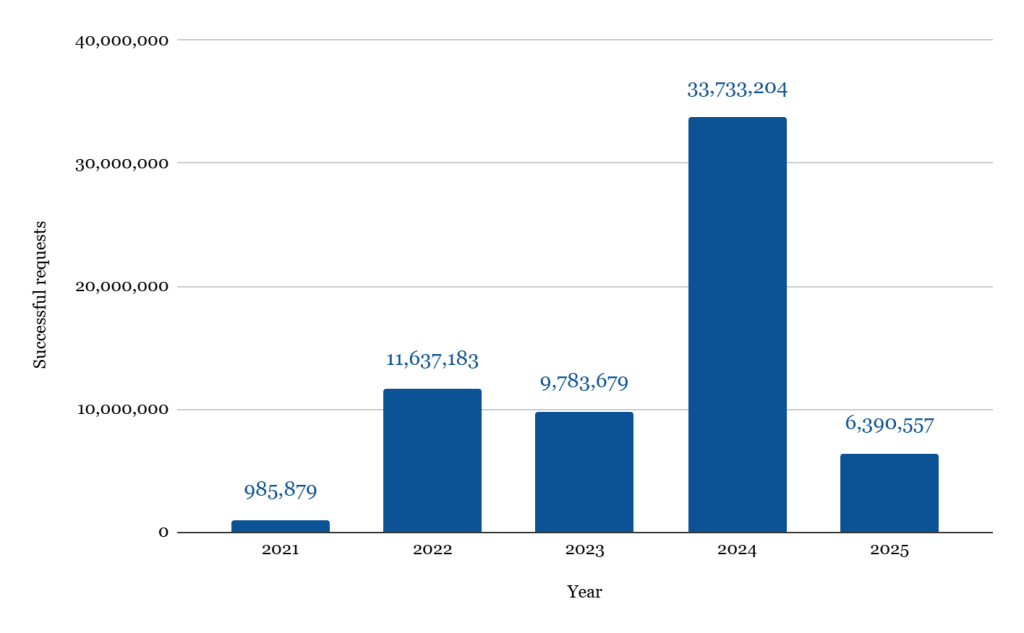
Figure 4: Growth of successful login requests over the years.
According to Mr. Jones Murangira, the ICT Head at Kabale University in South Western Uganda, more than 1,500 students are actively using eduroam, with login success rates steadily improving thanks to continuous training and support efforts. Upon admission, all students and staff receive institutional email accounts, along with both in-person and digital orientation sessions to ensure a smooth onboarding process.
Mr. Murangira notes, “The university now benefits from eight Metro eduroam hotspots installed near student hostels and staff housing, using solar-powered routers supplied by RENU. This setup has ensured consistent off-campus connectivity, supporting uninterrupted learning and work outside conventional classrooms and offices.”
Mr. Abaho Naboth, a Network Engineer at Mountains of the Moon University in Western Uganda, shares a similar experience: “Previously, staff primarily depended on mobile data for online teaching, which was not sustainable. As a result, many avoided online learning. The introduction of Metro eduroam hotspots significantly improved participation. By the end of June 2024, over 500 students had connected to eduroam.”
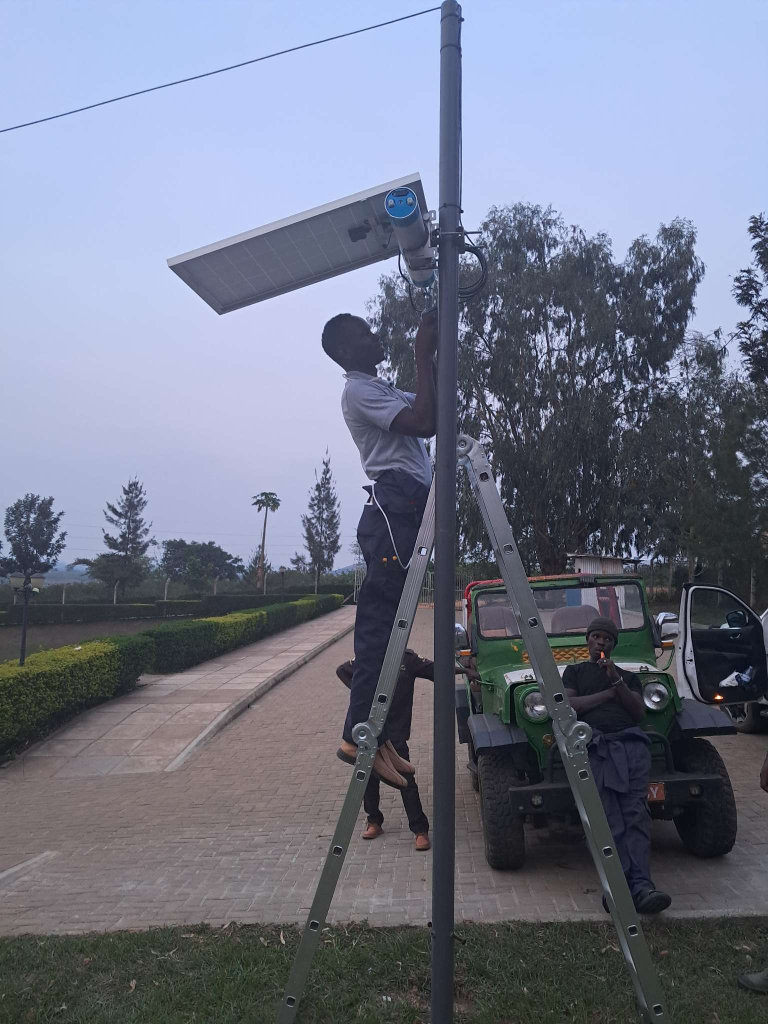
Figure 5: Solar-powered router being installed in Western Uganda.
The introduction of Metro eduroam has revolutionised academic and research connectivity by extending secure, high-speed Internet access beyond university campuses into public and metropolitan spaces. By improving off-campus access to digital learning platforms, research tools, and collaborative networks, Metro eduroam plays a vital role in supporting inclusive, uninterrupted academic engagement.
Below, we bring in detail how Metro eduroam is impacting on RENU member institutions and the lives of students.
Enhancing Online Learning and Reducing Data Costs
Bronia Isaac Akankwasa, a student at Kabale University, explained that before gaining access to Metro eduroam, he spent about UGX 2,000 daily on mobile Internet. Since connecting to eduroam, his daily data expenses have dropped to UGX 500. He utilises eduroam to access essential platforms such as My Student, e-learning systems, and research resources.
Students from Lira University in Northern Uganda shared similar experiences. One student noted that eduroam has significantly reduced her data costs: “I used to spend nearly UGX 16,000 per month on Internet bundles. Now, I spend around UGX 5,000—or sometimes nothing at all.”
Mariam Namirembe, also from Kabale University, highlighted how Metro eduroam has kept her connected even while traveling. “I once travelled to Mbarara University to visit a friend, and I had an online class scheduled. I didn’t have any data bundles at the time, but to my surprise, my phone automatically connected to eduroam while I was at Mbarara University, and I was able to attend the class without any interruptions.”
Another student from Lira University recounted a similar experience where he used eduroam at Makerere University which is located in Central Uganda, to attend a virtual lecture when he had no data. He was able to attend the lecture without any issues.
Shaping Accommodation Choices
The presence of Metro eduroam has also influenced student housing preferences. Hostels equipped with active eduroam hotspots have experienced increased demand, with some landlords using it as a selling point, such as Kings Hostel in Kabale in Western Uganda. According to Allan Masereka, a student at Kabale University, hostels like African Hostel, Hillside Hostel, Twino Hostel, and Town View Hostel have seen a rise in occupancy due to eduroam availability.
“When searching for accommodation, the first thing students ask is whether the hostel has eduroam,” he explained. “If it does, they’re much more likely to stay there, often valuing Internet access even more than affordability.”
Empowering Research and Academic Performance
Mr. Jones Murangira, Head of ICT at Kabale University, reported increased collaborative research activity, citing a noticeable rise in submissions to the university’s Institutional Digital Repository (IDR). He attributes this improvement in part to the consistent and widespread Internet access provided by eduroam. Kabale University now ranks third nationally on the AD Scientific Index, a milestone partly driven by enhanced connectivity.
Many students emphasised that without Metro eduroam, their Internet expenses would be difficult to manage. Alan Bright Arinaitwe, a student at the university, shared:
“Using mobile data to access our e-learning platforms was often unreliable—it was either too slow or wouldn’t connect. With eduroam, I enjoy fast, stable Internet, which has made my online learning experience smooth and efficient.”
Joslyn Asaba, a first-year student pursuing Bachelor of Science in Biotechnology at Kabale University, expressed her appreciation for eduroam, saying, “What I value most about eduroam is its free, reliable, and high-speed access. It allows me to attend online classes without spending on mobile data. When I used personal data, accessing the university’s e-learning platforms was often inconsistent—sometimes slow, and other times it wouldn’t connect at all. With eduroam, I now enjoy faster and more stable connectivity, which ensures a smooth, uninterrupted learning experience.”
Students at Lira University echoed similar sentiments. They noted that Metro eduroam has greatly improved access to online learning platforms while reducing reliance on expensive mobile data.
Adoption of eduroam as the Sole SSID
Metro eduroam continues to transform Internet connectivity at the institutional level across Uganda. Some institutions have gone a step further by adopting eduroam as the only Wi-Fi network (SSID) on their campuses, a significant shift that reflects deep trust in the solution’s security, scalability, and reliability.
At Heritage International School, the transition to eduroam was driven by a need for a secure, single sign-on network solution that wouldn’t compromise user experience. After rigorous exploration and consultation with RENU, the school fully implemented eduroam as its only SSID. This move has not only enhanced network control but also ensured that users enjoy seamless and secure connectivity both on and off-campus, a capability especially important for remote learning and travel.
Lira University also adopted eduroam as its exclusive SSID following a successful Direct Engineering Assistance (DEA) that was held by RENU in 2019. The university upgraded its infrastructure, trained its IT team, and sensitized its community about the benefits of eduroam and Metro eduroam. The result has been a significant transformation in academic and research capabilities. Students and staff now enjoy access to global educational resources, seamless mobility, and virtual collaboration with peers worldwide, all through a single set of credentials. The university has also taken steps to provide guest access for non-eduroam users, reflecting its inclusive approach to digital access.
At Uganda Christian University (UCU), eduroam is the sole SSID across all five of its campuses. As one of RENU’s founding members and earliest adopters of eduroam, UCU has long understood the power of secure wireless Internet connectivity in enabling academic growth and innovation. Today, UCU relies on eduroam, Metro eduroam hotspots, and eduroam on the Go devices to ensure students and staff have seamless, secure access to educational resources wherever they are.
These institutions’ stories exemplify how eduroam, especially when extended through Metro eduroam, is not just a connectivity solution but also a strategic tool for enhancing learning, teaching, research, and digital inclusivity.
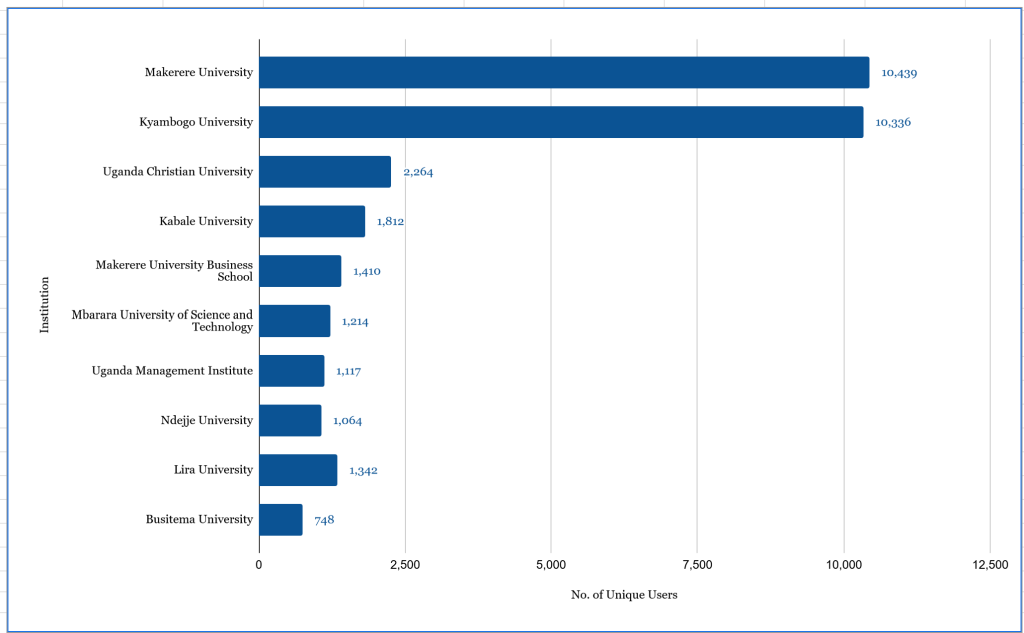
Figure 6: Top institutions with unique users in Q1 2025.
The success of the Metro eduroam service has featured in numerous public platforms such as 2024 IEEE PES/IAS PowerAfrica ( https://ieeexplore.ieee.org/document/10759345 ), UbuntuNet Alliance Website ( https://ubuntunet.net/stories/renu-deploys-300-eduroam-hotspots-for-off-campus-internet-access/ ) the AfricaConnect3 website ( https://africaconnect3.net/renu-makes-connectivity-accessible-to-all-through-metro-eduroam/ ) and RENU’s YouTube Channel ( https://youtu.be/GQoAI7u5XZo )
Through ongoing innovations such as solar-powered routers, the eduroam SpoT App, eduroam on the Go, and the anticipated eSIM integration, RENU is not only narrowing the digital divide but also building a robust and future-ready academic and research network for Uganda and the broader region.

